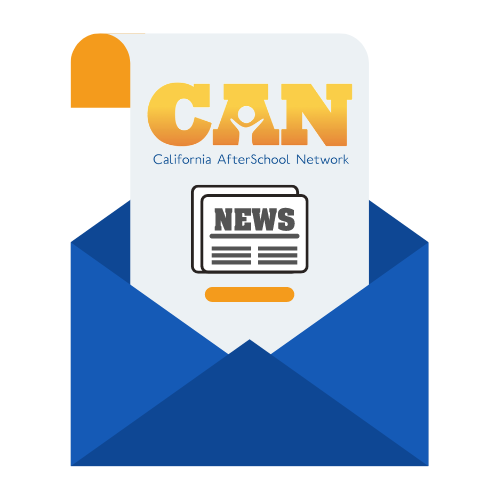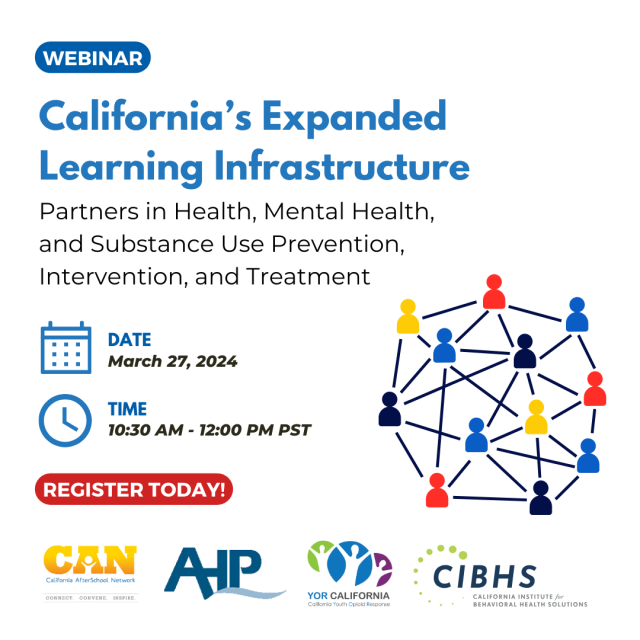California’s Expanded Learning Infrastructure: Partners in Health, Mental Health, and Substance Use Prevention, Intervention, and Treatment Webinar
California’s Expanded Learning Infrastructure: Partners in Health, Mental Health, and Substance Use Prevention, Intervention, and Treatment Webinar
March 27, 2024, 10:30 AM - 12:00 PM
The California AfterSchool Network (CAN), the California Department of Education’s Opportunities for All Branch, County Leads from the System of Support for Expanded Learning (SSEL) and other County Office of Education leaders, Advocates for Human Potential (AHP), the California Institute of Behavioral Health Solutions (CIBHS), and Community Based Organization leaders from the Boys and Girls Club convened an informative webinar to learn about the states vision for school-based wellness, and the potential of state, county/regional, and site-level partnerships to support access to school-based and school-linked health, mental health, and substance use prevention, intervention and treatment.
Supported by a coherent statewide vision, there has never been a better time to establish school-based and school-linked partnerships that support health, mental health, and substance use prevention, intervention, and treatment in California. California has the largest system of school-based and school-linked Expanded Learning programs (before school, after school, intersession, and summer) in the nation. This system is supported by a robust System of Support for Expanded Learning (SSEL). These programs, which exist in nearly every school district in the state, offer a flexible environment to support student and family wellness.
Webinar Objectives:
- Provide an overview of the sector’s challenges in partnership with schools and reaching youth.
- Provide an overview of the goals and the scale of California’s world-class Expanded Learning system and the opportunities for partnering with Expanded Learning programs as a viable strategy for reaching youth and engaging their families.
- Promote County and Regional partnerships with County agencies and the System of Support for Expanded Learning.
- Provide Local examples of how Expanded Learning programs have been leveraged to provide pathways to treatment.
Recording & Resources
- Webinar recording via YouTube
- Presentation Slides (PDF)
Resources shared from California Institute for Behavioral Health Sciences (CIBHS), Advocates for Human Potential, Inc (AHP) and California Youth Opioid Response (YOR CA)
- Campus Opioid Safety Act
- Naloxone_Distribution_Project (ca.gov) - CA GOV
- Standing_Order_and_Naloxone_for_Schools_FAQs.pdf (ca.gov) - CAN GOV.
- Non-prescription (“Over-the-Counter”) Naloxone Frequently Asked Questions - Substance Abuse and Mental Health Services Administration (SAMHSA) – Please note the SAMHSA Website is currently unavailable.
- How Naloxone Saves Lives in Opioid Overdose – Video from the National Institute on Drug Abuse (NIDA) (nih.gov)
- Resources For Parents & Families - Song For Charlie has created an accessible and convenient fentanyl education course that helps parents and caregivers connect with their children to have constructive conversations about the new chemical drug landscape. The course includes flexible online sections that can be completed at your own pace. Learn more
Resource from the California Department of Education
- Transforming Schools Initiative – The California Department of Education (CDE) is using these historic investments in public education to transform our California schools. It should be noted that as we look to transform our schools, it is critical that we integrate new programs and strategies to support our students, families, educators, and local educational agencies.
Resources from the California AfterSchool Network
- Statement of Stragetic Direction Towards Equity-Driven Whole Child Health and Wellness
- Call to Action
- Join our Listserv to receive our Health & Wellness Newsletters
Resources from Nora Hana, Director of the CA Healthy Kids Resource Center, County Opioid Task force member, and the San Joaquin County Office of Education
- California Healthy Kids Resource Center: https://californiahealthykids.net/home
- California Health Framework
- San Joaquin County Fentanyl Town Hall
- San Joaquin County Office of Education- Comprehensive Health Department
Resources from the County Leads from the System of Support for Expanded Learning (SSEL)
- Contact the System of Support for Expanded Learning (SSEL)
- 4 Pillars of Community Schools – Infographic
- General Information on Community Schools
- Sacramento County Office of Education (SCOE) Transforming Schools into Centers of Wellness
Guest Speakers
Thank you to the wonderful speakers and panelists who shared their incredible work and resources to support this convening. Our webinar was facilitated by Jeff Davis, Executive Director of the California AfterSchool Network (CAN), and included the following guests:
- Josh Blecha, Coordinator, Expanded Learning, Fresno County Superintendent of Schools
- Hannah Cohen, AMSW, Director Truancy Reduction Center, Boys and Girls Clubs of Garden Grove
- Mark Drewes, Director, Expanded Learning, Sacramento County Office of Education
- Ernesto Durán, Regional Director and Expanded Learning County Lead, Ventura County Office of Education
- Michael Funk, Director, Expanded Learning Division, California Department of Education
- Nora Hana, Director, Comprehensive Health, San Joaquin County Office of Education
- Sarah Neville Morgan, Deputy Superintendent of Public Instruction, Opportunities for All Branch, California Department of Education
- Louise Nieto, M.A., LMFT, Program Director for the California Youth Opioid Response program, Advocates for Human Potential
- Elizabeth Salazar, Consultant, California Institute of Behavioral Health Solutions
- Shamia Sandles, Program Director, Expanded Learning Programs (ASES/21st CCLC Programs), Alameda County Office of Education.
- Christina Sepulveda, Vice President of Community Impact Programs
Support Team
Questions or support? Please email Melissa Perez at mperez@afterschoolnetwork.org


